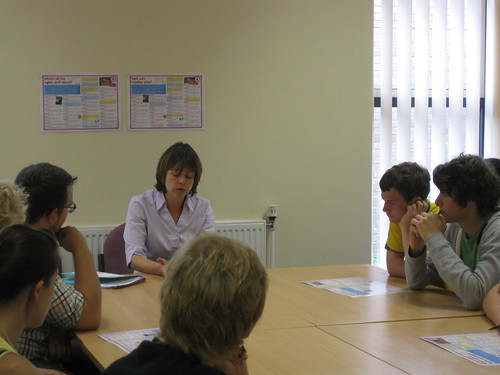Should the ICT Programme of Study be disapplied?
Yesterday I submitted my response to the English Government’s consultation on the issue of whether the ICT Programme of Study should be disapplied from September 2012. The consultation period ends today. I think responding is a very important thing to do, for reasons I’ll go into in a moment, but first, an explanation to readers not living in England, or a reminder to those who are.
 Consultation is key. Photo (c) 2010 National Assembly For Wales / Cynulliad Cymru In a nutshell, and somewhat paraphrasing, Michael Gove, Secretary of State for Education in England, said:
Consultation is key. Photo (c) 2010 National Assembly For Wales / Cynulliad Cymru In a nutshell, and somewhat paraphrasing, Michael Gove, Secretary of State for Education in England, said:
Look, folks. As you know, there has been a consultation process going on about whether or not ICT should remain in the National Curriculum after 2014. But, let’s face it, the Programme of Study is boring, unstimulating, not fit for purpose, so how about if we just let schools do their own thing for the next couple of years? They would still have to do ICT until 2014 at least, but they wouldn’t have to follow the Programme of Study or take any notice of its assessment guidance from September 2012. What do you think of that idea then?
NB: Mr Gove didn’t actually use those words, though I think that paragraph accurately reflects his views (though not necessarily mine).
Now, cynics may declare that it’s all in the bag, that the outcome is a foregone conclusion, namely that the ICT Programme of Study will be disapplied, come what may. I still think it’s important to take part in the process, for the following reasons:
Politicians are accountable
Call me naive, but if an overwhelming number of people disagreed with the idea of disapplying the Programme of Study, I think it would be hard for the Government to do so and get away with it. I also happen to believe that most people are honest most of the time.
I know my rights
I’ve spent my whole working life dealing with kids and adults who demand stuff, backing up their demand with that immortal phrase, “I know my rights!”. Well, I know mine too, and one of them is the right to take part in consultations about government policy. When I submitted my response to the consultation, I was informed that my reference number was 290. I do hope that isn’t the number of people who responded. Perhaps it’s the number of people who registered, which was optional – although, even so, that would be a pretty low number. I believe that people should exercise their rights, because otherwise there is always a danger that some bean counter in the Treasury will decide it’s not cost-effective to run a consultation for just a relative handful of people.
The outcome isn’t up to you
As it says in various religious texts, ones responsibility is to act, but you can’t control the outcome. So the argument that, for example, “nothing I say will make any difference” may be true, but it may not be: how would you know? In fact, you might say something so startlingly brilliant that someone from the Department for Education will contact you and ask how much you’d like as a “golden hello” to come and work for them (I’ve been sitting by the phone all morning; should be any time now…).
If you’d like to respond to the ICT consultation, here’s the link:
